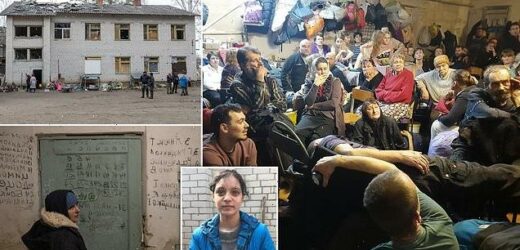Barbarity in the school basement: 300 people were trapped for a month in a 700sq ft room in a Ukrainian village… and the names of some of the 20 who never made it out are scrawled on the walls
- More than 300 people were forced into the basement in Yahidne, near Chernihiv
- Survivors have claimed Russian troops ordered them into the room on March 5
- Twenty people died in the dark cellar from exhaustion, hunger and suffocation
- The others only left after the town was retaken by Ukrainian forces this week
On the crumbling walls of a school basement, where more than 300 people were held for a month by Russian troops, the names of those who perished during the ordeal are scrawled.
At least 20 villagers died during their hellish captivity, their corpses left in the cellar along with their compatriots.
Such were the conditions in the dark, 700sq ft basement in Yahidne, a farming community near the city of Chernihiv, the elderly died from exhaustion, hunger or suffocation.
Hundreds of people were trapped in the basement of a school in the Ukrainian village of Yahidne for a month. Pictured are people inside the room the day after Russian troops left the village
Mykola Klymchuk, 60, is fortunate to be alive.
Showing reporters the appalling conditions in the basement, he told how he had tied himself to a railing with his scarf so he would not fall over when sleeping standing up, surrounded by the bodies of those who had died.
This was the reality for hundreds of people – including around 50 children and babies – for 25 days after Russian troops stormed the village and forced its residents at gunpoint into the damp basement.
With claims of Russians shooting residents dead or using them as human shields, it is the latest harrowing account of Putin’s forces targeting innocent civilians since evidence emerged this week of war crimes in the town of Bucha.
The names of people who died inside the basement have been inscribed on the wall to remember them. Pictured is Halyna Tolochina, standing in front of the impromptu memorial
Pointing at the names of the dead, Halyna Tolochina, a member of the village council, said those to the left of the door were killed by soldiers.
The others died because of the harsh conditions in the dismal basement.
‘This old man died first,’ she said, pointing to the name of Dmytro Muzyka, who succumbed to the suffocating conditions on March 9.
His body lay in a boiler room for days until the Russians let their captives out during a break in the shelling to dig shallow graves in the village cemetery, she said.
Residents of Yahidne have told how Russian troops who arrived in early March initially appeared fair.
But many then began looting homes, ‘taking everything they could grab’.
On March 5, the residents were ordered into the basement and were told it was ‘for their own protection’.
People survey the damage as they stand in front of the damaged school on Wednesday, April 6
However they were forced to share a bucket for a toilet and had to take turns sleeping because there was not enough room for everyone to lie down.
Mr Klymchuk said that the basement was so cramped he could not move in case he stepped on someone.
‘This was my half-a-metre of space,’ he told the BBC. ‘I tied myself to the railing here with my scarf so I wouldn’t fall over. I spent 25 nights like this.’
The grandfather said Russian troops sometimes took captives to use as ‘human shields’ during fighting.
Anastasiia, 15, said she was trapped in the basement along with her father and grandmother.
Anastasiia (pictured), 15, was stuck in the basement with her father and grandmother while Russian troops occupied the village
‘There was barely any room,’ she told the BBC. ‘We were living sitting up. We were sleeping sitting up. Not that we slept at all.’
On March 30 soldiers started their withdrawal amid plans to redeploy elsewhere. Only then could those trapped in the basement dare to venture outside.
The last remaining captives emerged on April 2.
Meanwhile, a senior military official claimed yesterday that Russian troops raped a pregnant 16-year-old and a grandmother aged 78 in a village around Kherson, in southern Ukraine, as forces withdrew.
Source: Read Full Article






